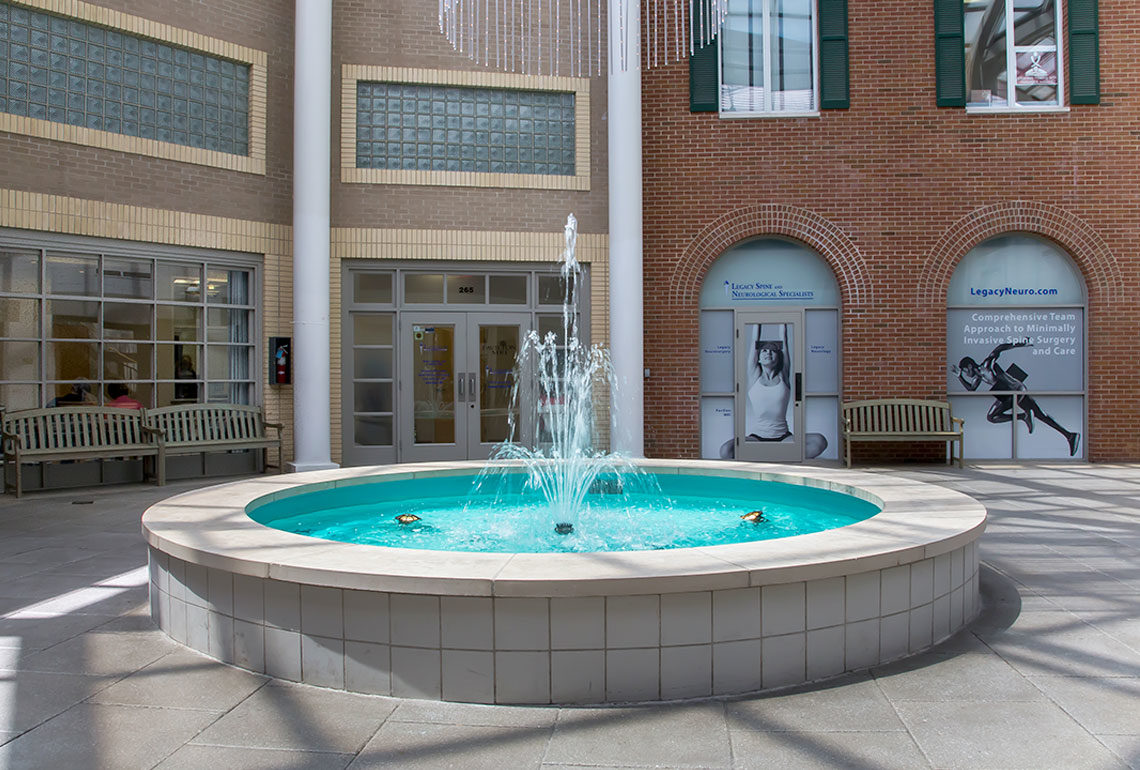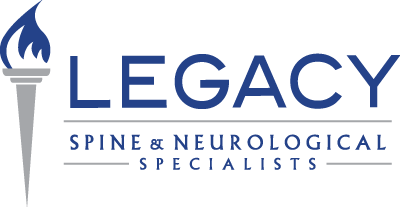
Legacy Spine & Neurological Specialists
For many patients, healing and rehabilitation requires more than the services of a neurologist or neurosurgeon. To completely address each patient’s unique issues, Legacy Spine and Neurological Specialists utilizes a team approach, combining neurological expertise, minimally invasive (MIS) care, state-of-the-art neuro-imaging and neurologically-focused physical therapy to create the full-spectrum of integrated care for each of our patients. Each of our services – neurology, neurosurgery, physical therapy and neuro-imaging – are provided by expert spine and neurological physicians, therapists, technicians and nurses.
THE MIG-LIF PROCEDURE
Our experienced neurosurgeons lead the nation in the development and advancement of computer and image-guided micro spine surgery. The Legacy Spinous Process MIG-LIF procedure was developed by our neurosurgery team and is one of the most advanced and innovative MIS lumbar fusion procedures in the world. It was developed to treat lumbar stenosis/instability, a very advanced form of back and associated leg pain. It allows for marked reduction in post-op pain, quicker recovery time, less blood loss, significantly lower risk of MRSA infections, and lower costs for patients needing lumbar decompression and fusion procedures. In a retrospective clinical study, 40 patients suffering from degenerative disc disease who tested positive for radicular pain and segmental instability were treated using the MIG LIF Procedure. All 40 patients were successfully discharged the same day of surgery. Learn more on our MIG-LIF page.
Click here to read details about the MIG-LIF.
Watch the MIG-LIF Patient Education video and the Patient Testimonial video.
OUR HISTORY
Our practice name Legacy Spine & Neurological Specialists honors our former partners, Ray Jouett, MD, and Ronald Williams, MD, who blazed the trail for advanced neurosurgical care in this region. These pioneers of neurological surgery brought their expertise and knowledge to Arkansas and set the standard for specialized care of the brain, spine and peripheral nerves. The torch has since been passed to neurosurgeons Scott Schlesinger, MD, FACS, Dominic Maggio, MD, and our current medical team. As one of the most established practices in the state – boasting a combined 80 years of highly-conservative neurological care – we have delivered great outcomes for our patients, avoiding surgery whenever possible.
OUR MISSION
Our mission is to make a lasting impact on the lives of our patients, by delivering life-changing, minimally invasive, neurosurgical care. As we look to our storied past, we are compelled to do our part in forging a better future for our field and, most importantly, our patients and their families. We are committed to advocating the most conservative approach to patient care—always treating all our patients as if they were members of our family.
EASE
We offer 4 convenient ways for referrals to our clinic:
We will make every effort to get your referral seen within 3 business days for urgent neurosurgery evaluations; 1–2 weeks for direct spinal injection referrals and 1 – 2 weeks for neurology referrals. Emergency referrals should be made by calling 501.400.3168.
ONLINE
EMAIL
CALL (501) 661-0077
FAX (501) 664-2749
OUR AREAS OF EXPERTISE
Our technical expertise in the delicate microsurgery of tumors and aneurysms of the brain has now been applied to MIS, creating many advantages to the care we provide. Our neurosurgical skills come from training at some of the most prestigious programs in the world, including UT Parkland Dallas, Lausanne, Switzerland, and Cornell & Memorial Sloan Kettering in NYC. Our neurologists were trained at the prestigious Wake Forest University and with premier neuromuscular specialist Dr. Stacy Rudnicki. Meet our team to learn more.
Why A Neurosurgeon Is The Smart Choice For Your Spine
Neurosurgeons and orthopedic surgeons are both typically certified to perform spinal surgery, making it difficult for patients to decide which specialty best addresses their issues. More often than not, a neurosurgeon is the optimum choice when dealing with spinal issues, as the brain, spine and nervous system are the sole focus of our medical training, where orthopedic surgeons are trained to care for the entire musculoskeletal system.
In fact spine surgery patients that choose to be treated by an orthopedic surgeon are more likely to:
- Endure a longer hospital stay
- Experience complications from surgery
- Need continued care post surgery
- Require a perioperative transfusion
Read more about this subject here.
- MIS
- SPINE
- BRAIN
- TRIGEMINAL NEURALGIA
- PAVILION MRI
- MIG-LIF
Minimally Invasive Care
Our goal is to avoid surgery whenever possible. For spine conditions, non-surgical treatment plans can incorporate physical therapy, chiropractic referrals, non-narcotic medications and spinal injections. These options are often effective with conditions such as herniated discs, degenerative discs, spinal stenosis and spondylolisthesis. For a small number of our patients, surgery will be the only real option due to the severity of their condition.
If surgery is necessary, our neurosurgeons are adept at the most advanced and minimally invasive procedures for the care of the brain, spine and peripheral nerves. More than half of the spinal surgeries performed at Legacy are outpatient, ambulatory, minimally invasive microsurgery procedures, including spinal decompressions, anterior cervical discectomies and fusions, lumbar micro-discectomies and lumbar fusions. In some cases, remarkable results can be delivered through surgery using an incision as small as an inch or two.
We also treat brain disorders as conservatively as possible. Many brain conditions, including various benign tumors and vascular abnormalities, can and should be assessed with periodic imaging, without the need for any form of surgery.
Non-Surgical Treatment Options
- Physical Therapy
- View testimonials from our patients and learn more about our PT program.
- Fluoroscopically Guided Spinal Injections; Epidural, Facet and Nerve Blocks
- Watch our doctors walk patients through the injection process.
- Percutaneous facet rhizotomy
- Percutaneous vertebral augmentation including vertebroplasty and kyphoplasty
- Minimally Invasive Surgery (MIS)
- Learn why Legacy is the perfect choice for your spinal surgical needs.
- Percutaneous spine surgery
- Minimally invasive computer-navigation assisted spinal fusions and instrumentation
- Microscopic spinal decompression and discectomy
- Learn about microdescectomy with Dr. Schlesinger and Dr. Maggio
- Microscopic minimally invasive brain surgery for trigeminal neuralgia and brain tumors
- Discover how this debilitating condition is treated at Legacy.
- Minimally invasive peripheral nerve surgery including carpal tunnel surgery and ulnar nerve surgery
- Listen to Dr. Schlesinger explain how he can get you back to life in less time and with less pain.
Spine
When it comes to treating spine disorders, we see surgery as a last resort. Legacy Neuro offers comprehensive care for spine disorders and injuries, including the use of physical therapy, chiropractic referrals, non-narcotic medications and spinal injections.
Spine Conditions Treated Include:
- Herniated Discs
- Spinal Stenosis
- Spinal Deformities
- Trauma
- Spondylolisthesis
- Low Back Pain and Neck Pain
For a small percentage of patients, the severity of their conditions will make surgery the only real option for treatment. When appropriate, we offer minimally invasive procedures that are usually performed on an outpatient basis. Using incisions as small as one or two inches, these procedures offer faster recovery times than traditional surgery.
Minimally Invasive Surgery (MIS)
- Percutaneous spine surgery
- Minimally invasive computer-navigation assisted spinal fusions and instrumentation
- Microscopic spinal decompression and discectomy
- Microscopic minimally invasive brain surgery for trigeminal neuralgia, brain tumors, aneurysms and vascular malformations
- Minimally invasive peripheral nerve surgery including carpal tunnel surgery and ulnar nerve surgery
View our minimally invasive surgery videos.
Brain
At Legacy Neuro, we maintain a conservative approach to the care of brain disorders, providing treatment options that will be least invasive, yet effective. Many brain conditions, including various benign tumors and vascular abnormalities, won’t require surgery, and can be monitored through serial imaging.
When necessary, we offer state-of-the-art surgical intervention including computer assisted, minimally invasive micro-neurosurgery for treatment of selected brain tumors, trigeminal neuralgia cases, aneurysms and vascular malformations and numerous other conditions.
Brain Disorders & Injuries Treated Include:
- Brain Tumors
- Pituitary Tumors
- Trigeminal Neuralgia
Trigeminal Neuralgia
Trigeminal Neuralgia (TN), tic douloureux, is one of the most painful conditions known to mankind. At Legacy Neuro, we have successfully relieved this debilitating condition for thousands of patients.
This condition is characterized by intense facial pain distributed through one of the branches of the trigeminal or fifth cranial nerve. This disorder is usually due to an arterial loop of the superior cerebellar artery distorting and compressing the trigeminal nerve just proximal to its ganglion as the nerve root exits the brainstem. This compression results in some damage to the nerve root entry zone over time, and ultimately can lead to severe paroxysms of pain in one of the branches of the trigeminal nerve. This condition usually occurs in patients over 50 years and affects women slightly more than men.
Diagnosis
There are no diagnostic tests or imaging studies to confirm trigeminal neuralgia. Clinical diagnosis is based solely on a patient’s history.
Symptoms
- Sharp facial pain lasting from a few seconds to a couple of minutes that progresses in frequency and severity over time
- Pain described as shock like or stabs of electricity in the face
- Development of facial pain triggers such as swallowing, eating, drinking and shaving
- Mental incapacitation
Treatment
Before beginning treatment, the diagnosis of Trigeminal Neuralgia must be firmly established by evaluating the patient’s medical history and performing a physical exam. A high resolution MRI of the brain should be performed to rule out other problems.
Medical management with Tegretol and/or other neuroleptic medications (Dilantin, Neurotin, Lyrica) should be tried as the first treatment option in most cases. Patients will usually respond to medical management but it is not uncommon for medications to either cease to be effective or cause adverse side effects, requiring the consideration of other options.
Decompression Craniotomy Surgery via the Microvascular Decompression (MVD) is the gold standard of the surgical treatment options. It involves micorosurgically displacing the cause of the pain, usually an arterial loop of the superior cerebellar artery, away from the nerve and inserting a piece of felt-like sponge material between the nerve and arterial loop to attempt to keep them separated. This operation has the highest success rate of all treatment options with the lowest recurrence rate. Nevertheless, there is still about a 10–12 percent chance of recurrence even if properly done and with a very good initial response. If pain returns, a patient can still try other medical management or treatment options.
At Legacy Neuro, decompression surgery has been very successful with a low incidence of complications and recurrence rate. All patients have reported significant improvement/resolution and most were able to stop taking all neuroleptic medications. Even those few that have had recurrences of pain had an initial excellent response and to date have responded to subsequent treatment. The prognosis of surgically treated cases has been excellent.
Should you have a patient you suspect of having trigeminal neuralgia or should you have it yourself, contact Legacy. We will use our unrivaled expertise to get you back to life.
View Dr. Schlesinger discuss Trigeminal neuralgia.
Pavilion MRI
Pavilion MRI combines the latest technology in neuro-imaging with experienced, friendly technicians, physicians and staff, to create the most high-quality, comfortable MRI experience. Our clinic features a GE 1.5T “closed” MRI machine, the largest wide bore high-resolution magnet on the market. This state-of-the-art MRI is designed with a more spacious setting to help reduce patient anxiety, and is ideal for those who may be claustrophobic. The design can also accommodate larger body types (weighing up to 500 pounds). We seamlessly merge high-resolution with comfort, and provide the highest-quality images available for any area of the body, excluding the heart and breasts.
Preliminary results are available to the patient’s physician within an hour of the MRl appointment. Preliminary reports are available within minutes by a national radiologist group and sub-specialists in all body areas and systems scanned by our MRI. Experienced technicians and an on-site physician are available to ensure quality of the scanning experience and to provide sedation when needed for the claustrophobic patient.
Pavilion MRI is conveniently located in the quiet, serene and beautiful setting of the Pavilion in the Park center in Little Rock. We offer flexible scheduling, including nights and weekends. Often, same day appointments are possible. Friendly, cooperative staff is available to assist in all aspects of scheduling and authorization.
Visit here for more information about Pavilion MRI.
MIG-LIF
Our experienced neurosurgeons lead the nation in the development and advancement of computer and image-guided micro spine surgery. The Legacy Spinous Process MIG-LIF procedure was developed by our neurosurgery team and is one of the most advanced and innovative MIS lumbar fusion procedures in the world.
What is MIG-LIF?
Conceived by Dr. Scott Schlesinger, The MIG-LIF procedure – Midline Image Guided Lumbar Interbody Fusion – is one of the most minimally invasive key hole operations available in the world for lumbar laminectomy and fusion surgery. Our experienced neurosurgeons Dr. Maggio and Dr. Schlesinger lead the nation in the development and advancement of this computer and image-guided micro spine surgery.
What are benefits of the MIG-LIF?
- It is often performed outpatient or with shorter hospital stays
- It allows for quicker recovery time
- Patients report reduced post-op pain
- There is a lower risk of MRSA infections
- There are lower costs that traditional surgery
- The use of innovative, cutting edge technology to help realign and stabilize the spine while healing occurs
In a retrospective clinical study, 40 patients suffering from degenerative disc disease who tested positive for radicular pain and segmental instability were treated using the Legacy Spinous Process MIG-LIF procedure. All 40 patients were successfully discharged the same day of surgery. Learn more on our MIG-LIF page.
What conditions does the MIG-LIF treat?
Degenerative Disc Disease including spondylolisthesis with objective evidence of neurologic impairment, fracture, dislocation, scoliosis, kyphosis, spinal tumor, and failed previous fusion (pseudoarthrosis).
Click here to read details about the MIG-LIF.
Watch the MIG-LIF Patient Education video and the Patient Testimonial video.

